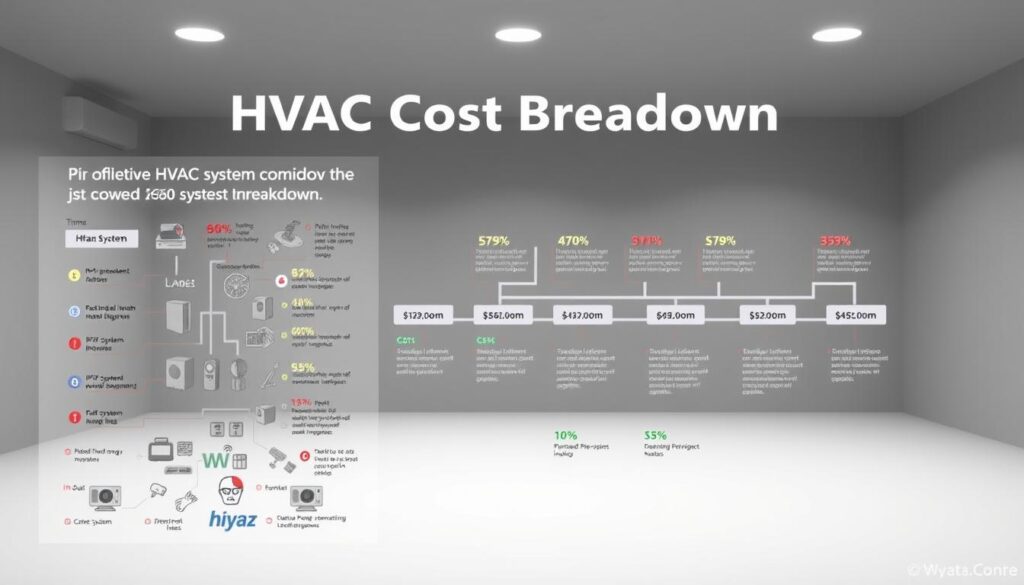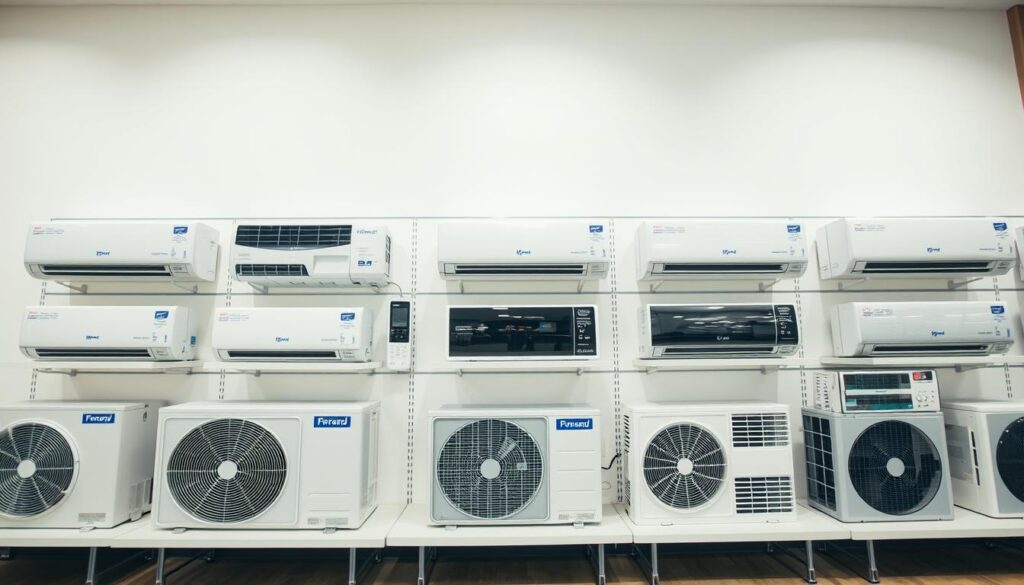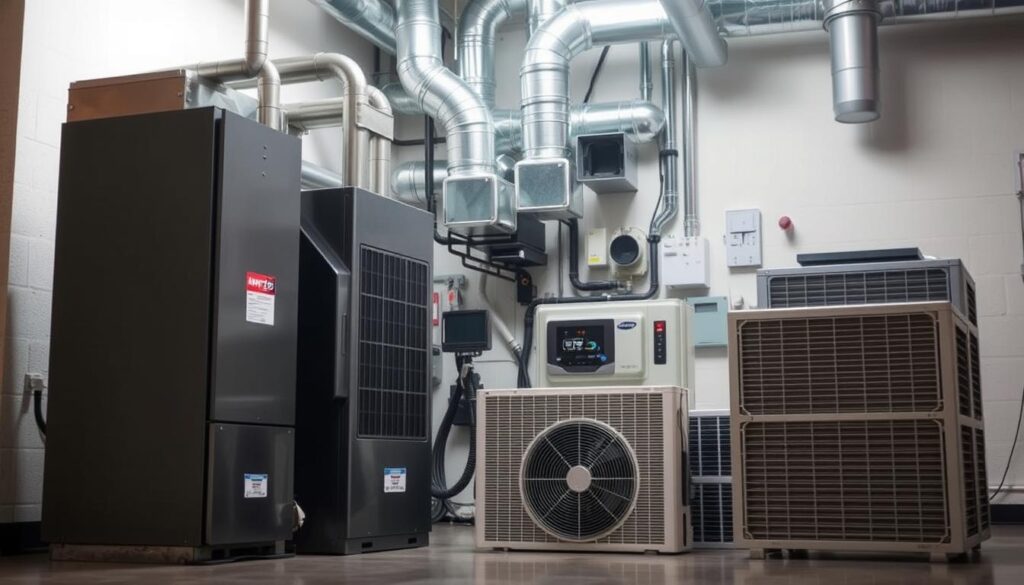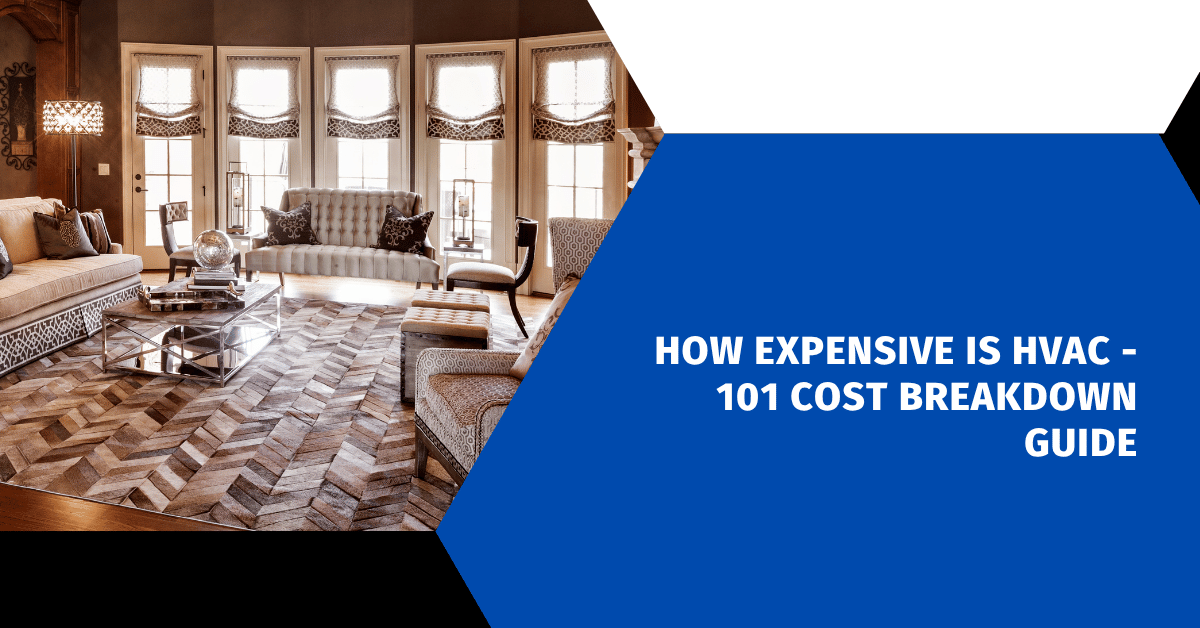Affiliate Disclosure
HVAC Guide Guys is a participant in the Amazon Services LLC Associates Program, an affiliate advertising program designed to provide a means for sites to earn advertising fees by advertising and linking to Amazon.
How Expensive Is HVAC? Are you curious about the cost of HVAC systems? You might be surprised by the hidden costs during installation. Understanding the cost of heating, ventilation, and air conditioning can be tricky for homeowners.

Angi reports the national average for a new HVAC system is about $7,500. Prices usually range from $5,000 to $12,500. These costs can change a lot based on different factors. It’s important to know the pricing details before investing in your home.
Your HVAC system is more than just a buy. It’s a long-term investment in your home’s comfort and energy savings. To understand the cost of HVAC systems, we need to look at installation, equipment, labor, and future savings.
Key Takeaways
- National HVAC system costs average between $5,000 and $12,500
- Prices vary based on home size, system type, and regional factors
- Consider both upfront costs and long-term energy efficiency
- Professional installation is critical for optimal performance
- Multiple financing options can help manage initial expenses
Table of Contents
Understanding HVAC System Basics and Their Price Range
When looking at HVAC installation prices, it’s key to know the basics. Heating, ventilation, and air conditioning systems keep your home comfy and the air clean.
The HVAC market has many choices for different homes. Knowing these options can guide you in choosing the right system for your budget.
Types of HVAC Systems Available
Here are your HVAC system choices:
- Central Air Conditioning Systems
- Heat Pumps
- Ductless Mini-Split Systems
- Geothermal Systems
Average National Cost Overview
HVAC installation prices usually fall between $5,000 to $11,000. A full system with ducts can cost $7,000 to $16,000. Prices vary due to several factors.
Factors Affecting Initial Investment
Several things affect hvac system prices:
- Home size and square footage
- System efficiency ratings
- Local climate conditions
- Installation complexity
- Energy efficiency requirements
“Investing in the right HVAC system can save you significant money in the long run through improved energy efficiency.”
Knowing these factors helps you choose wisely. It balances the initial cost with long-term savings.
Explore Our HVAC Shop
Looking for top-rated HVAC tools, parts, and accessories? Visit our shop and find the perfect solution for your needs.
Visit the ShopComplete HVAC Installation Costs by System Type
Knowing the cost of HVAC units is key when setting up your home’s climate control. Various HVAC systems have different prices, affecting your budget.
Let’s look at the most common HVAC systems and their typical costs:
- Central Air Conditioning Systems
- Average installation cost: $3,500 – $8,500
- Covers about 66% of U.S. homes
- Great for cooling your whole home and keeping a steady temperature
- Heat Pump Systems
- Air-source heat pump: $4,000 – $10,000
- Ductless mini-split heat pump: $2,000 – $5,000
- Geothermal heat pump: $10,000 – $30,000
- Furnace Options
- Electric furnace: $2,000 – $8,000
- Gas furnace: $4,000 – $10,000
- Oil furnace: $6,000 – $10,000
Pro tip: Higher efficiency systems cost more upfront but can save a lot on energy bills over time.
| System Type | Low-End Cost | High-End Cost |
|---|---|---|
| Central Air Conditioner | $3,500 | $8,500 |
| Heat Pump | $4,000 | $10,000 |
| Furnace | $3,000 | $6,500 |
“Investing in the right HVAC system can improve your home’s comfort and energy efficiency.” – HVAC Industry Expert
Keep in mind, installation costs can change based on your home’s size, local labor rates, and specific system needs. Always talk to a professional HVAC technician for an accurate estimate for your home.
Explore Our HVAC Shop
Looking for top-rated HVAC tools, parts, and accessories? Visit our shop and find the perfect solution for your needs.
Visit the ShopHow Expensive Is HVAC: Square Footage Impact on Pricing
Knowing how hvac costs relate to your home’s size helps with budgeting. The size of your home greatly affects the cost of an HVAC system.
When figuring out hvac costs for your home, remember these important points:
- HVAC systems usually cost between $3 to $7 per square foot
- A 2,000 square foot home might cost $6,000 to $12,000
- Bigger homes need stronger systems, which raises costs
Cost Calculations Per Square Foot
The cost varies based on your home’s details:
- Air conditioning: $0.25 to $0.50 per square foot
- Heating: $0.10 to $0.30 per square foot
- Ductwork installation: $1 to $5 per square foot
Home Size and System Requirements
Your home’s size affects the HVAC system you need. A 1,600-square-foot home usually needs a 2.5-ton air conditioning unit. This can cost between $3,000 and $4,000.
Multi-Story Home Considerations
“Larger and multi-story homes often require more complex HVAC solutions, potentially increasing overall installation costs.”
For multi-story homes, you might need:
- Zoned heating and cooling systems
- Multiple units for even temperature
- More ductwork or ductless mini-split systems
Even though hvac costs might seem high at first, a good system can save you money in the long run.
Brand Comparison and Price Variations

Looking into hvac unit costs, you’ll see big price differences among brands. Knowing these can help you choose the right heating and cooling system for your home.
Popular HVAC brands have their own pricing. This is based on quality, features, and how well they work. Here’s what sets them apart:
- Lennox is the top choice but comes with a higher price tag
- Goodman is more affordable for those on a budget
- Carrier falls in the middle with solid performance
Here’s a look at the cost for a 3-ton HVAC system:
| Brand | Electric System | Heat Pump | Gas System |
|---|---|---|---|
| Lennox | $8,232.61 | $8,663.05 | $9,047.35 |
| Goodman | $6,765.84 | $7,261.69 | $7,579.35 |
Note: Prices include equipment costs and may change with installation.
“Invest in quality, but be smart about your hvac system prices.” – HVAC Industry Expert
When picking a brand, think about more than just the price:
- Warranty coverage
- Energy efficiency ratings
- Local service technician availability
- Long-term reliability
Your home’s needs will guide you to the best HVAC brand and system.
Explore Our HVAC Shop
Looking for top-rated HVAC tools, parts, and accessories? Visit our shop and find the perfect solution for your needs.
Visit the ShopDuctwork Installation and Replacement Expenses
When planning your HVAC installation prices, understanding ductwork costs is key. Ductwork is like your home’s circulatory system for heating and cooling. It greatly affects the cost of replacing your HVAC system and how well it works.
The cost of installing ductwork can change a lot. Several things affect the price. These include your home’s layout, the materials used, and its size.
New Ductwork Installation Costs
Installing new ductwork in a typical home costs between $1,400 and $5,600. The average cost is about $5,498. Sometimes, it can go up to $9,500.
The cost usually depends on the size of your home. Here’s a breakdown:
- 1,000 to 2,500-square-foot home: $1,500 to $3,000
- 2,000 to 3,500-square-foot home: $2,500 to $5,000
- 3,000 to 4,500-square-foot home: $3,500 to $7,000
Material Quality Options
| Duct Material | Cost per Linear Foot | Best For |
|---|---|---|
| Galvanized Steel | $11.94 – $34.72 | Durability and Longevity |
| Uninsulated Fiberglass | $7.21 – $30.49 | Budget-Conscious Projects |
| Insulated Fiberglass | $7.09 – $36.25 | Energy Efficiency |
Ductwork Modification Expenses
Changing your ductwork can be cheaper than replacing it. Professional HVAC technicians charge between $18.93 and $35.23 per hour. Most jobs take 2-3 days to finish.
“Investing in quality ductwork is investing in your home’s comfort and energy efficiency.” – HVAC Professional
Remember, good ductwork is key for your HVAC system’s performance. It also helps save on energy costs in the long run.
Energy Efficiency Ratings and Cost Impact
It’s important to know about energy efficiency ratings when looking at hvac costs and prices. These ratings affect your energy bills and how well your system works.
Two main metrics help you understand HVAC system efficiency:
- SEER (Seasonal Energy Efficiency Ratio): Shows cooling efficiency
- AFUE (Annual Fuel Utilization Efficiency): Measures heating performance
A higher SEER rating means your cooling system is more efficient. For example, a system with a SEER of 18 uses less energy to cool than one with a SEER of 13. AFUE ratings also show how well your heating system works:
- 90-93% AFUE: Mid-efficiency systems
- 94% and above: High-efficiency systems
“Investing in an energy-efficient HVAC system can lead to substantial long-term savings, despite higher upfront costs.”
When choosing your HVAC system, think about these factors:
- Climate conditions in your area
- How well your home is insulated
- How much energy you expect to use
- What you can afford to spend at first
Look for the Energy Star label. It means the system meets strict energy standards set by the U.S. Environmental Protection Agency. Even though high-efficiency systems cost more at first, they can save you a lot on energy bills later.
Explore Our HVAC Shop
Looking for top-rated HVAC tools, parts, and accessories? Visit our shop and find the perfect solution for your needs.
Visit the ShopInstallation Labor Costs and Regional Variations
Understanding hvac installation prices is more than just about the equipment. Labor costs play a big role in how much homeowners spend, varying by region.
HVAC installation labor costs can greatly affect your total investment. Experts usually charge between $75 to $150 per hour. Total labor costs can range from $1,000 to $3,000, depending on the system’s complexity and where you live.
Professional Installation Requirements
Getting a professional to install your HVAC is key for good system performance and warranty coverage. Certified technicians ensure:
- Proper system sizing
- Correct equipment placement
- Optimal performance calibration
- Compliance with local building codes
Geographic Price Differences
HVAC installation prices change a lot depending on where you are. Cities with higher costs of living usually have more expensive labor rates than rural areas.
| Region | Average Labor Rate | Cost Complexity Factor |
|---|---|---|
| Northeast Urban | $125-$175/hour | High |
| Midwest Rural | $75-$100/hour | Low |
| Southern Suburban | $90-$130/hour | Medium |
Seasonal Cost Fluctuations
Choosing the right time for installation can help save money. Summer and winter are peak seasons with higher rates. Installing during the shoulder seasons might lower your costs.
“Timing is everything when it comes to reducing HVAC installation expenses.” – HVAC Industry Expert
Looking into local contractors, getting several quotes, and knowing about regional prices can help you make a smart choice for your HVAC investment.
Additional Components and Upgrade Costs
Homeowners often forget about the extra costs of additional components and system upgrades. These can make your air quality and system performance better. But, they also raise your hvac unit costs.

- Whole-house humidifiers: Pricing ranges from $400 to $1,200 installed
- Dehumidifiers: Costs between $1,500 to $3,500
- Air purification systems: Investment from $400 to $4,000
- Smart thermostats: Additional $200 to $500
Smart homeowners see the value in these upgrades. A good air purification system can get rid of allergens and pollutants. It makes your home healthier. Smart thermostats help control temperature and save energy.
“Investing in HVAC upgrades is not an expense, but a long-term strategy for comfort and efficiency.” – HVAC Industry Expert
Before upgrading, think about what you need. Look at your local climate, home size, and current HVAC system. Some upgrades improve comfort right away. Others save energy over time.
| Upgrade Type | Cost Range | Potential Benefits |
|---|---|---|
| Whole-House Humidifier | $400 – $1,200 | Improved air moisture, reduced static electricity |
| Air Purification System | $400 – $4,000 | Allergen removal, healthier indoor air |
| Smart Thermostat | $200 – $500 | Energy savings, remote control |
While these upgrades cost more upfront, they can save you money on energy in the long run. They also make your home more comfortable. Talk to a professional HVAC technician to find the best upgrades for you.
Explore Our HVAC Shop
Looking for top-rated HVAC tools, parts, and accessories? Visit our shop and find the perfect solution for your needs.
Visit the ShopFinancing Options and Payment Solutions
Getting affordable HVAC solutions doesn’t have to be expensive. Knowing your financing options can help you manage costs. This makes upgrading your home’s comfort more achievable.
There are many financing paths for homeowners to manage their HVAC costs:
Loan Types for HVAC Investments
- Personal loans from $250 to $15,000
- Home equity lines of credit (HELOCs)
- Credit cards with promotional zero-interest periods
Manufacturer Financing Programs
Top brands like Trane offer great financing options:
- 0% APR for 60 months on equal payments
- Promotional financing available through December 31, 2024
- Flexible payment plans for various installation costs
Tax Credits and Rebates
Federal tax credits can greatly lower your HVAC costs:
- Heat pump tax credit up to $2,000
- Ductless system tax credit up to $2,000
- Furnace tax credit up to $600
- Air conditioner tax credit up to $600
“Energy-efficient HVAC systems cost 20-30% more upfront but provide substantial long-term utility savings.”
Those with good credit (690+ scores) have more financing options. It’s important to compare to find the best affordable HVAC solutions for your budget and home.
Conclusion
Figuring out how expensive HVAC is can be tricky. But, your investment is more than just the initial cost. It’s about balancing upfront costs with long-term efficiency and performance.
For example, central air systems cost between $5,000 to $8,000. Mini-split installations range from $3,000 to $7,000. Your choice affects both immediate and future costs.
HVAC maintenance costs are key to your system’s life and performance. Choosing a high-efficiency system might cost more upfront. But, it can cut your annual energy bills a lot.
Professional installation and regular maintenance are essential. They help your system work better and avoid unexpected repair costs.
Your HVAC operating expenses depend on several factors. These include system type, home size, and local climate. Smart homeowners invest in quality equipment and professional service for long-term savings.
Getting multiple quotes and understanding financing options are smart moves. They help you make a choice that balances comfort, performance, and cost.
Remember, your HVAC system is a big investment in your home’s comfort and value. Take your time to research and consult experts. Choose a solution that fits your needs and offers the best efficiency and reliability.
FAQ
How much does a typical HVAC system cost?
What factors most affect HVAC installation costs?
Are high-efficiency HVAC systems worth the extra cost?
How much does ductwork installation cost?
How much does a typical HVAC system cost?
What factors most affect HVAC installation costs?
Are high-efficiency HVAC systems worth the extra cost?
How much does ductwork installation cost?
FAQ
How much does a typical HVAC system cost?
HVAC system prices vary a lot, from ,000 to ,000 for a full setup. The cost depends on the system type, home size, and how efficient it is. For example, central air systems cost between ,500 and ,500. Heat pumps can be ,000 to ,000, based on your needs.
What factors most affect HVAC installation costs?
Several things affect HVAC costs. These include home size, system type, energy efficiency, local labor rates, ductwork condition, and the brand. The bigger your home, the bigger the system you need. Better efficiency means lower costs over time. Also, complex setups or ductwork changes can raise the price.
Are high-efficiency HVAC systems worth the extra cost?
Yes, high-efficiency systems cost more upfront but save money in the long run. They use less energy, cutting your bills by 20-40%. If you plan to stay in your home, the savings make it worth it.
How much does ductwork installation cost?
Ductwork costs
FAQ
How much does a typical HVAC system cost?
HVAC system prices vary a lot, from $5,000 to $12,000 for a full setup. The cost depends on the system type, home size, and how efficient it is. For example, central air systems cost between $3,500 and $7,500. Heat pumps can be $4,000 to $10,000, based on your needs.
What factors most affect HVAC installation costs?
Several things affect HVAC costs. These include home size, system type, energy efficiency, local labor rates, ductwork condition, and the brand. The bigger your home, the bigger the system you need. Better efficiency means lower costs over time. Also, complex setups or ductwork changes can raise the price.
Are high-efficiency HVAC systems worth the extra cost?
Yes, high-efficiency systems cost more upfront but save money in the long run. They use less energy, cutting your bills by 20-40%. If you plan to stay in your home, the savings make it worth it.
How much does ductwork installation cost?
Ductwork costs $1,000 to $5,000, depending on your home’s size and complexity. The cost depends on the material, how easy it is to access, and if you need new or replacement ducts. For a typical home, expect to pay $2,500 to $3,500.
What are the most affordable HVAC system options?
Ductless mini-split systems are often the cheapest, costing $2,000 to $7,000. Window units and portable air conditioners are even cheaper for small spaces. For central systems, Goodman and Rheem are more affordable than Carrier or Trane.
How can I reduce my HVAC installation costs?
To save on HVAC costs, install during off-peak seasons and explore financing options. Look for tax credits or rebates. Get quotes from different contractors and choose mid-range systems. Proper insulation helps too. Some utilities offer discounts for energy-efficient systems.
How often should I replace my HVAC system?
HVAC systems usually last 10-15 years with care. But, it depends on the type, how much you use it, maintenance, and your area’s climate. If it’s over 10 years old, breaks down a lot, or isn’t efficient, it’s time to replace it. Regular maintenance can extend its life and keep it running well.
Do I need special financing for HVAC installation?
Yes, there are many financing options for HVAC systems. You can use manufacturer programs, home equity loans, personal loans, or credit cards with low rates. Contractors often have financing plans or work with banks for flexible payments. Also, look for tax credits for energy-efficient systems to help with costs.
,000 to ,000, depending on your home’s size and complexity. The cost depends on the material, how easy it is to access, and if you need new or replacement ducts. For a typical home, expect to pay ,500 to ,500.
What are the most affordable HVAC system options?
Ductless mini-split systems are often the cheapest, costing ,000 to ,000. Window units and portable air conditioners are even cheaper for small spaces. For central systems, Goodman and Rheem are more affordable than Carrier or Trane.
How can I reduce my HVAC installation costs?
To save on HVAC costs, install during off-peak seasons and explore financing options. Look for tax credits or rebates. Get quotes from different contractors and choose mid-range systems. Proper insulation helps too. Some utilities offer discounts for energy-efficient systems.
How often should I replace my HVAC system?
HVAC systems usually last 10-15 years with care. But, it depends on the type, how much you use it, maintenance, and your area’s climate. If it’s over 10 years old, breaks down a lot, or isn’t efficient, it’s time to replace it. Regular maintenance can extend its life and keep it running well.
Do I need special financing for HVAC installation?
Yes, there are many financing options for HVAC systems. You can use manufacturer programs, home equity loans, personal loans, or credit cards with low rates. Contractors often have financing plans or work with banks for flexible payments. Also, look for tax credits for energy-efficient systems to help with costs.

